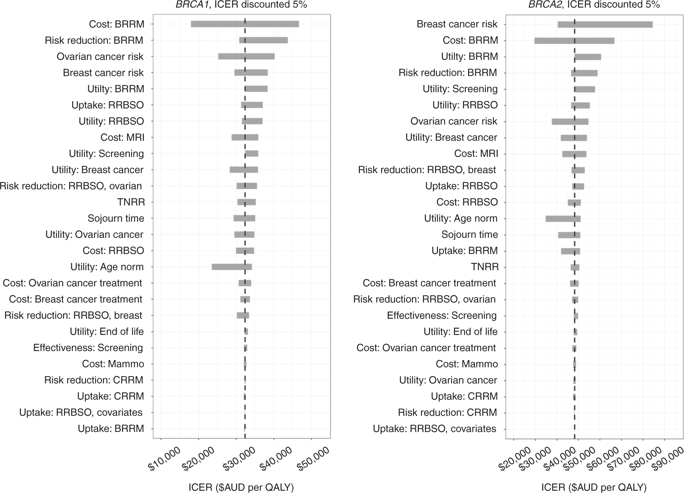当前位置:
X-MOL 学术
›
Genet. Med.
›
论文详情
Our official English website, www.x-mol.net, welcomes your
feedback! (Note: you will need to create a separate account there.)
Cost-effectiveness of long-term clinical management of BRCA pathogenic variant carriers.
Genetics in Medicine ( IF 6.6 ) Pub Date : 2020-01-30 , DOI: 10.1038/s41436-020-0751-3 Lara Petelin 1, 2 , Lucinda Hossack 3, 4 , Mary Shanahan 1 , Gillian Mitchell 2, 4 , Danny Liew 5 , Paul A James 1, 2 , Alison H Trainer 1, 2
Genetics in Medicine ( IF 6.6 ) Pub Date : 2020-01-30 , DOI: 10.1038/s41436-020-0751-3 Lara Petelin 1, 2 , Lucinda Hossack 3, 4 , Mary Shanahan 1 , Gillian Mitchell 2, 4 , Danny Liew 5 , Paul A James 1, 2 , Alison H Trainer 1, 2
Affiliation

|
PURPOSE
Women who inherit a BRCA1 or BRCA2 pathogenic variant are at high risk of developing breast and ovarian cancer. Evidence for the effectiveness and cost-effectiveness of long-term management in clinical practice is lacking. The purpose of this study was to evaluate the real-world cost-effectiveness of BRCA carrier management within a structured clinical program.
METHODS
Lifetime health outcomes and costs of clinical management for female unaffected BRCA carriers aged 20 were measured using a microsimulation model. For the intervention, women could attend a high-risk clinic, undergo risk-reducing surgery, and receive annual breast screening. Input data for the model was from a clinical database of 983 BRCA carriers. The comparator was no risk management. Outcomes were discounted at 5%.
RESULTS
The incremental cost-effectiveness ratio for the program was $32,359 to $48,263 per quality-adjusted life-year (QALY). Limiting uptake of risk-reducing salpingo-oophorectomy to <50% of carriers decreased cost-effectiveness by $7000-8000 per QALY. Achieving perfect adherence to guidelines was less cost-effective for BRCA2 due to increased risk-reducing mastectomy costs with smaller incremental health benefit.
CONCLUSION
Long-term management of BRCA carriers within a structured clinical program is cost-effective. Suboptimal adherence to risk management guidelines can substantially affect outcomes and is an important consideration for future studies.
中文翻译:

BRCA 致病性变异携带者长期临床管理的成本效益。
目的 继承 BRCA1 或 BRCA2 致病性变异的女性患乳腺癌和卵巢癌的风险很高。缺乏临床实践中长期管理的有效性和成本效益的证据。本研究的目的是评估结构化临床计划中 BRCA 携带者管理的实际成本效益。方法 使用微观模拟模型测量 20 岁未受影响的女性 BRCA 携带者的终生健康结果和临床管理成本。对于干预措施,女性可以去高风险诊所,接受降低风险的手术,并接受年度乳房筛查。该模型的输入数据来自 983 名 BRCA 携带者的临床数据库。比较对象是没有风险管理。结果折现为 5%。结果 该计划的增量成本效益比为每质量调整生命年 (QALY) 32,359 美元至 48,263 美元。将降低风险的输卵管卵巢切除术限制在 <50% 的携带者范围内,每个 QALY 的成本效益降低了 7000-8000 美元。由于降低风险的乳房切除术成本增加而增加的健康收益较小,因此完全遵守指南对 BRCA2 的成本效益较低。结论 在结构化临床计划中对 BRCA 携带者进行长期管理具有成本效益。对风险管理指南的不理想遵守可能会对结果产生重大影响,并且是未来研究的重要考虑因素。50% 的运营商将每个 QALY 的成本效益降低了 7000-8000 美元。由于降低风险的乳房切除术成本增加而增加的健康收益较小,因此完全遵守指南对 BRCA2 的成本效益较低。结论 在结构化临床计划中对 BRCA 携带者进行长期管理具有成本效益。对风险管理指南的不理想遵守可能会对结果产生重大影响,并且是未来研究的重要考虑因素。50% 的运营商将每个 QALY 的成本效益降低了 7000-8000 美元。由于降低风险的乳房切除术成本增加而增加的健康收益较小,因此完全遵守指南对 BRCA2 的成本效益较低。结论 在结构化临床计划中对 BRCA 携带者进行长期管理具有成本效益。对风险管理指南的不理想遵守可能会对结果产生重大影响,并且是未来研究的重要考虑因素。
更新日期:2020-01-30
中文翻译:

BRCA 致病性变异携带者长期临床管理的成本效益。
目的 继承 BRCA1 或 BRCA2 致病性变异的女性患乳腺癌和卵巢癌的风险很高。缺乏临床实践中长期管理的有效性和成本效益的证据。本研究的目的是评估结构化临床计划中 BRCA 携带者管理的实际成本效益。方法 使用微观模拟模型测量 20 岁未受影响的女性 BRCA 携带者的终生健康结果和临床管理成本。对于干预措施,女性可以去高风险诊所,接受降低风险的手术,并接受年度乳房筛查。该模型的输入数据来自 983 名 BRCA 携带者的临床数据库。比较对象是没有风险管理。结果折现为 5%。结果 该计划的增量成本效益比为每质量调整生命年 (QALY) 32,359 美元至 48,263 美元。将降低风险的输卵管卵巢切除术限制在 <50% 的携带者范围内,每个 QALY 的成本效益降低了 7000-8000 美元。由于降低风险的乳房切除术成本增加而增加的健康收益较小,因此完全遵守指南对 BRCA2 的成本效益较低。结论 在结构化临床计划中对 BRCA 携带者进行长期管理具有成本效益。对风险管理指南的不理想遵守可能会对结果产生重大影响,并且是未来研究的重要考虑因素。50% 的运营商将每个 QALY 的成本效益降低了 7000-8000 美元。由于降低风险的乳房切除术成本增加而增加的健康收益较小,因此完全遵守指南对 BRCA2 的成本效益较低。结论 在结构化临床计划中对 BRCA 携带者进行长期管理具有成本效益。对风险管理指南的不理想遵守可能会对结果产生重大影响,并且是未来研究的重要考虑因素。50% 的运营商将每个 QALY 的成本效益降低了 7000-8000 美元。由于降低风险的乳房切除术成本增加而增加的健康收益较小,因此完全遵守指南对 BRCA2 的成本效益较低。结论 在结构化临床计划中对 BRCA 携带者进行长期管理具有成本效益。对风险管理指南的不理想遵守可能会对结果产生重大影响,并且是未来研究的重要考虑因素。











































 京公网安备 11010802027423号
京公网安备 11010802027423号